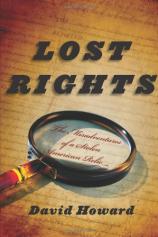Lost Rights: The Misadventures of a Stolen American Relic
Review
Lost Rights: The Misadventures of a Stolen American Relic
The next time you find yourself thumbing through old papers at some thrift shop or flea market, remember Charles A. Shotwell.
Back in 1866, Shotwell bought a piece of old parchment from a fellow Civil War veteran for $5 in a small Ohio town. It stayed in his family for well over a century, a mere curiosity, a relic of family history like many another such object --- until, that is, it turned out to be one of the 14 original copies of the Bill of Rights, worth several million dollars at the very least. It had been looted from the state capital building in Raleigh, North Carolina, by some unknown Union soldier in Gen. William Sherman’s marauding army during the final death throes of the defeated Confederacy.
The discovery set off a kind of civil war of its own, a lengthy struggle over legal ownership, purchase price, final resting place and iconic value that pitted antique dealers, historians, lawyers, museum officials and historical preservationists against each other. This bizarre story is explored in detail in this book by David Howard, who is, somewhat improbably given his subject, the executive editor of Bicycling Magazine.
There were indeed 14 originals of the document, penned painstakingly by a team of three clerks at the close of the Constitutional Convention in Philadelphia in 1789. There was one to be sent to each of the 13 original states and one for the new federal government’s own records. Over the years, five of them had gone missing due to fire, carelessness, or simple bureaucratic neglect.
The story starts with an insoluble mystery. No one knows exactly who filched the document from the Raleigh archives. Charles Shotwell never named the person to whom he paid that $5. We know only that the thief was a member of an Ohio regiment. He and his buddies were running rampant through the abandoned capital building, grabbing whatever souvenirs they wanted.
Howard traces the document’s history doggedly. For many years it hung unnoticed on the wall of an Indianapolis businessman. It spent a night or two stashed under the bed of a high-end antique dealer. It was studied, and eventually authenticated, by some of the heaviest hitters in the historic preservation business. Estimates of its worth ran as high as $30 million. The discovery also raised daunting ethical questions. Who really owns history? How much is it worth? Should such a document ever be sold for private profit? Was the document actually stolen in the first place?
When word of the find reached North Carolina, the state obviously wanted its copy back. A newly established constitutional museum in Philadelphia wanted to put it on display. The Shotwell heirs put in a claim. Antique dealers prowled about the edges of the battlefield like vultures looking for prey. The cast of characters is large and colorful.
Howard tells the complicated story in breezy prose. We get a rather chastening picture of the antique document business itself, replete with chicanery, outright lying and purposeful deception by dealers who are not exactly pillars of professional virtue. His narrative is weakened, however, by a tendency to explore all sorts of side issues and peripheral topics that slow down the book’s pace. Some of these are somewhat interesting, but they give the book an episodic feeling. Howard also jumps erratically back and forth in time instead of telling a chronologically straight-line story.
One example: The story ends in 2003 on the 32nd floor of a Philadelphia office tower just yards from where those three clerks penned the original document. The FBI had been contacted, and there was a question of a federal crime --- transporting stolen property across state lines. An elaborate sting operation was concocted. Unsuspecting potential sellers were lured to a bogus sale closing. But then, just as the FBI agents burst through the door, Howard irritatingly pauses for yet another civics-textbook sermon on the historic value of the Bill of Rights. Bad move.
North Carolina got its document back in 2005 --- 140 years after it went missing. Charles Shotwell and his unknown Ohio buddy may not be thrilled as they rest in peace. But justice was finally done.
Reviewed by Robert Finn (Robertfinn@aol.com) on January 6, 2011
Lost Rights: The Misadventures of a Stolen American Relic
- Publication Date: July 2, 2010
- Genres: History, Nonfiction
- Hardcover: 352 pages
- Publisher: Houghton Mifflin Harcourt
- ISBN-10: 0618826076
- ISBN-13: 9780618826070




